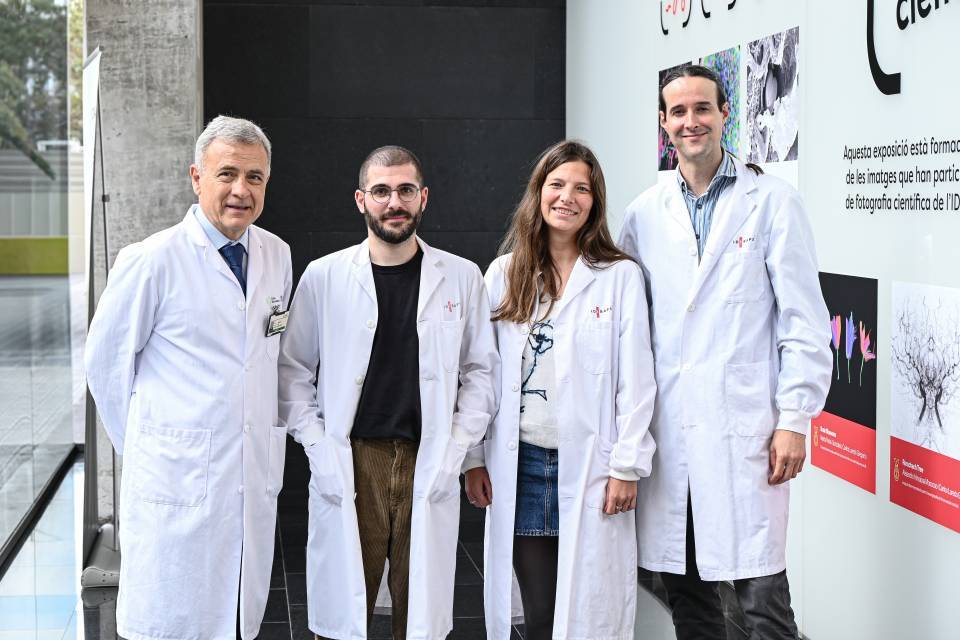The study shows that the risk of developing colorectal cancer in patients with Lynch syndrome is not the same for all carriers, but depends on the specific mutated gene. This hereditary syndrome significantly increases the likelihood of cancer, but the research has identified which patients have a higher risk of developing precancerous lesions and cancer, and who has a lower one. This finding will allow a better adaptation of the frequency and intensity of medical surveillance, making prevention more effective and personalized for each person.
The study, published in the journal Gastroenterology and involving 26 Spanish centers and one in the Netherlands, was coordinated by Francesc Balaguer, head of the Gastroenterology Department at Hospital Clínic and researcher at IDIBAPS’ Gastrointestinal and Pancreatic Oncology group and CIBEREHD, with Drs. Maria Pellisé and Leticia Moreira as co–lead authors. The first author was Ariadna Sánchez, researcher from the same team.
Lynch syndrome: hereditary predisposition to colorectal cancer
Lynch syndrome is a hereditary disease caused by mutations in DNA repair genes (MLH1, MSH2, MSH6, and PMS2). These mutations lead to an accumulation of genetic errors that increase the risk of cancer, especially colorectal, but also other associated tumors. For this reason, patients undergo colonoscopies every two years to detect and remove precancerous lesions, known as adenomas, before they progress to cancer.
How the affected gene conditions colorectal cancer risk
The multicenter study thoroughly reviewed all colonoscopies performed in more than 1,700 adults with Lynch syndrome from 26 centers across Spain and one in the Netherlands.
“This study has allowed us to identify which patients are more likely to develop precancerous lesions, and how this risk varies depending on the mutated gene,” explains Ariadna Sánchez.
The results indicate that patients with mutations in the MLH1 and MSH2 genes are at higher risk of developing advanced adenomas and colorectal cancer. In contrast, those carrying MSH6 and PMS2 mutations show a lower risk, with MSH6 carriers presenting an intermediate profile.
“We have also identified that the presence of advanced adenomas is an independent risk factor that increases the probability of cancer, which is why a more intensive follow-up is recommended when these lesions are detected,” Sánchez adds.
Personalized prevention in patients with Lynch syndrome
The data from this study provide strong evidence to adapt and personalize surveillance protocols for patients with Lynch syndrome. Dr. Francesc Balaguer highlights that “not all patients are at the same risk, which is why it is necessary to adjust the frequency and intensity of colonoscopies according to the implicated gene and the detection of advanced adenomas.”
This personalized approach will allow for improved prevention of colorectal cancer, avoiding unnecessary examinations in lower-risk patients and focusing more resources on those at higher risk. The research represents an important step towards more precise and efficient medicine at the service of patients.
The study involved a broad network of centers associated with the Spanish Association of Gastroenterology (AEG), as well as the Catalan Institute of Oncology (ICO), which contributed a large number of patients, and the UAMC in Amsterdam.
This multicenter collaboration was essential to ensure the comprehensiveness and quality of the study, allowing a detailed assessment of all colonoscopies performed, the description of the types of lesions found, and their incidence according to the affected gene.
“This is an example of how collaborative and well-organized research can have a direct impact on clinical practice,” stresses Francesc Balaguer. “We now have robust data to design follow-up protocols tailored to genetic profiles and endoscopic findings.”
Study reference:
Sánchez, A., Castillo-Iturra, J., Roos, V. H., Dueñas, N., Pineda, M., Moreno, L., Rodríguez-Alonso, L., Ramon Y Cajal, T., Llort, G., Piñol, V., Lopez Fernández, A., Salces, I., Picó, M. D., Rivas, L., Bujanda, L., Garzon, M., Pizarro, A., Martinez de Castro, E., Lopez-Arias, M. J., Poves, C., … Balaguer, F. (2025). Gene-Specific Detection Rate of Adenomas and Advanced Adenomas in Lynch Syndrome. Gastroenterology, Apr 30:S0016-5085(25)00650-X. https://doi.org/10.1053/j.gastro.2025.03.042




